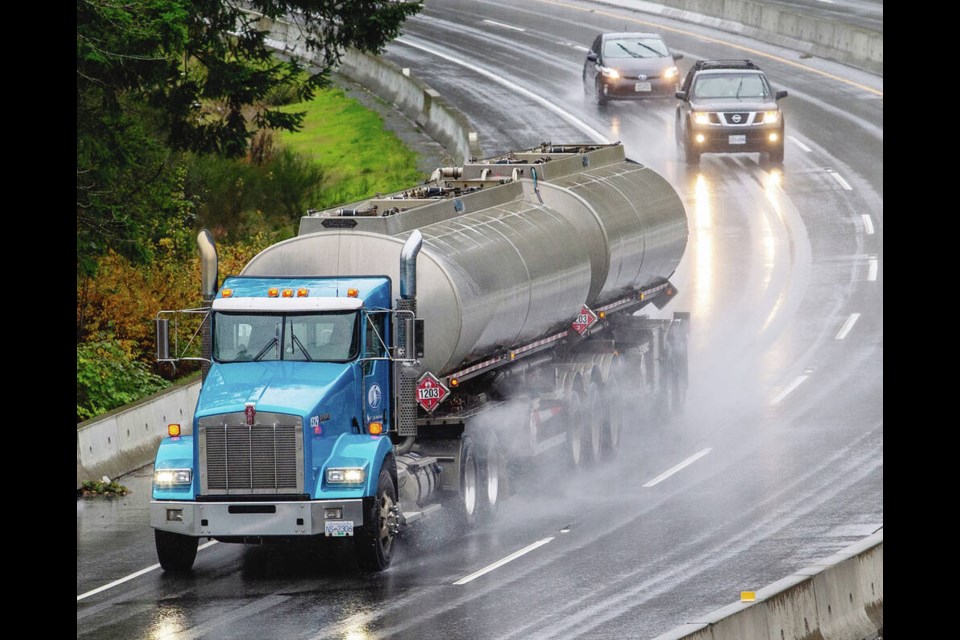The Malahat is now open to single-lane alternating traffic 24 hours a day, since repair work has progressed faster than expected. It should be complete by the end of the day Monday, the Ministry of Transportation said Thursday.
Overnight closures that began Nov. 15 had been expected to last until Monday.
Motorists should still expect intermittent short closures to give priority to certain vehicles, said Janelle Staite, South Coast region representative for the Ministry of Transportation.
“For example, we shuttled busloads of health-care workers for shift change through the site, we’re shuttling convoys of fuel trucks through the site,” she said. “We’re accommodating ambulances, fire.”
Fifteen fuel tanker trucks mustered at Bamberton at 9 a.m. Thursday and travelled south with an escort to refill gas stations that had been running dry.
Staite said damage to the highway included the failure of a retaining wall in the Tunnel Hill area, which undermined the stability of the road base under the northbound lanes.
Crews have been digging the affected area out, drilling into the rockface and sinking special nails to restore stability.
“Now we’re able to rebuild the road back up slowly, and then ultimately get that wall back in there,” Staite said.
That will allow the lanes to be propped up and stabilized “in perpetuity,” she said.
Staite said drivers are still advised to travel the Malahat only if it is essential.
“We are seeing some significant queues, but for the most part, people have been patient,” she said. “We’ve been dealing with some folks who are less patient and less kind to our staff and our contractors on site, but as a whole, I think, people are being pretty understanding.”
Crews will be on site through the weekend, Staite said. “It is a bit slower for us to work when we have the traffic right beside us.”
The rain that led to the damage was “unprecedented,” she said, but general maintenance and ensuring culverts are clear of debris is expected to keep typical rainstorms from causing damage.
Langford warned Thursday that the intersection of Finlayson Arm Road and the Trans-Canada Highway remains closed in both directions, with Finlayson Arm Road residents asked to use Millstream Road.
Repairs are underway in the flooded portion of lower Finlayson Arm Road, the city said.
With fuel supply sharply reduced by the highway closures, vehicles began lining up at Greater Victoria service stations Wednesday. By Thursday morning, many stations had run out of gas and blocked off their pumps. But relief is in sight with the arrival of the fuel-truck convoy and reopening of the Malahat to 24-hour traffic.
Peninsula Co-op’s transport company had at least five trucks — separate from the convoy — heading south on the Malahat around 6 a.m. Thursday, with four earmarked for Co-op stations, said director of operations Erik Gault.
“We had trucks dropping product by 6:30 a.m. at a couple of locations.”
He said 10 of the company’s 12 Greater Victoria stations had run out of fuel. Normally, Peninsula Co-op would see four to eight loads of fuel come south each day, but none got through from Sunday until Tuesday.
Problems with stations running dry should gradually end over the next week to 10 days, Gault said.
Leithan Slade of Suncor, which owns Petro-Canada, said the company was working as quickly as possible to refill sites in Greater Victoria that were out of fuel.
Vancouver Island stations are supplied with gas off-loaded at five terminals north of the Malahat. Shell has a tank farm at Bare Point near Chemainus, while Imperial Oil (Esso) and Suncor (Petro-Can) have terminals in Nanaimo. Parkland Fuel has terminals at Port Hardy and at Hatch Point at Cobble Hill.
A spokesperson for Parkland said the company was monitoring the temporary shutdown of the Trans Mountain pipeline and the flood-related rail disruption closely.
Up to 40 per cent of gasoline sold in B.C. normally arrives in the province as a refined product through the Trans Mountain pipeline, which was shut down Sunday due to flooding and extreme weather. Trans Mountain Corporation said it’s making every effort to restart the pipeline as soon as possible.
However, gasoline is also produced in B.C. at Parkland Corporation’s Burnaby refinery. Parkland says it is maintaining supply to its network of retail service stations, and operating the refinery using existing crude oil inventories.
Gasoline is also entering B.C. from Washington state.
“The broader supply chain for essential fuels is resilient,” said a statement from the company.
— With files from The Canadian Press





